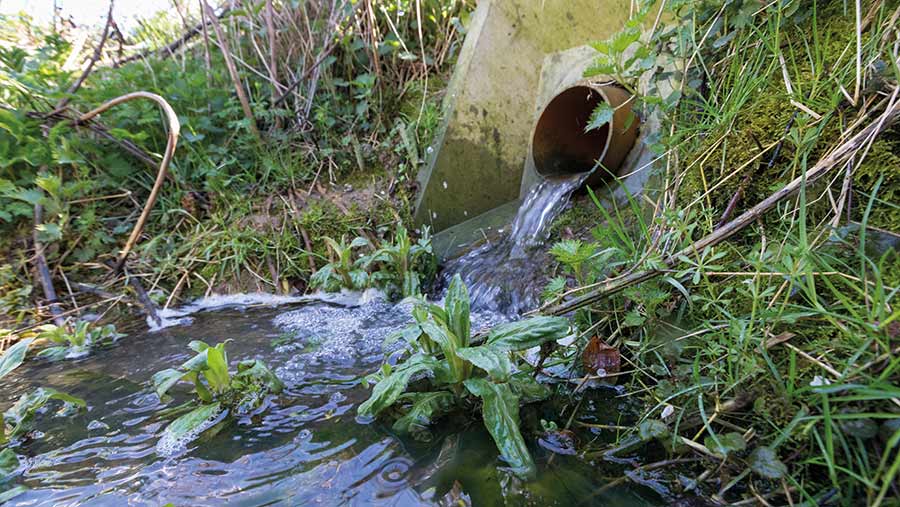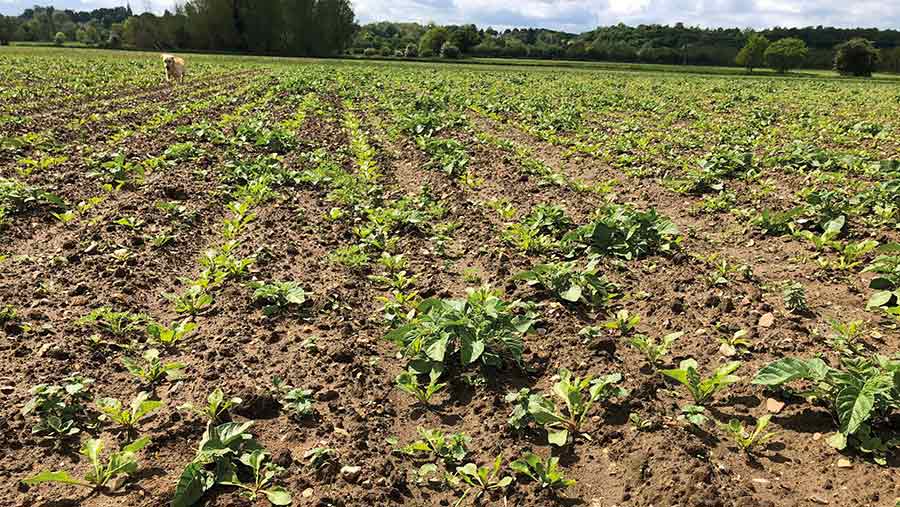How farmers can use Anglian Water water protection grants
 © Gary Naylor
© Gary Naylor Grants of up to £7,500 are on offer to farmers trying out new approaches to protect water quality in Anglian Water priority catchments, with the application window opening next month.
The company’s Farming Innovation Grant is aimed at supporting and developing new solutions that help to reduce pollutants getting into watercourses which benefits the wider environment and safeguards raw water resources ahead of drinking water treatment.
After a successful pilot scheme with farmers around reservoirs and within key groundwater areas last year, Anglian Water is widening its offer for this autumn in a second round.
The intention is to support farmers and share some of the risk associated with trialling new approaches and changing practices.
See also: Are perennial grain crops close to being a realistic alternative?
As before, the grant will be match-funded. Having previously supported 19 on-farm projects and delivered more than £250,000 of benefit across the Anglian Water region, the initiative is expected to be popular.
What the grant can be spent on
As Chris Hewis, catchment adviser at Anglian Water, explains, the company is keen for farmers to come up with ideas that are appropriate for their farms, so that they can be assessed for their suitability before funds are released.
“There’s a huge amount of flexibility in this scheme,” he says. “It may be a new and innovative approach that needs support, or the expansion of an existing approach to be incorporated into the business.
“Providing it helps to protect raw water quality, we will be interested in understanding more about the proposal.”
He adds that Anglian Water is also looking for value for money, which is why funds could be available for purchasing second-hand equipment and for joint projects.
His colleague, Gary Hodgetts, stresses that there are no set options or specific criteria to meet.
“We know from previous experience that land and water connectivity is key. The flexibility of this grant allows us to work and learn together, so that we get local solutions to local challenges.”
Anything that could help to protect water from pesticides, nutrients, pathogens or soil loss could be relevant, he adds.
In the past, successful applications have included direct drill purchases, software licences to allow variable-rate fertiliser applications, sprayer nozzle upgrades, robotic weeding technology developments and many others – including the switch to herbicide-tolerant crops to eliminate the use of certain herbicides (see case study below).
Other potential bids could include cover crops, agroforestry, buffer strips, nutrient use efficiency improvements, machinery modifications, new technology and surface water protection.
“There are no set ideas – the whole point is to encourage innovation and hear what proposals farmers have and how they might work,” stresses Mr Hewis.
The applications will be assessed on an agreed list of criteria, including a farm’s location and its connectivity to drinking water, the project’s potential and risks, the likely outputs, delivery timescale and duration of any benefits.
The cost justification for both Anglian Water and the applicant will also be considered.
“Reducing the risks of any pollution at source – whether that’s from pesticides, nutrients, pathogens or soil – helps to keep water treatments costs down and ensure supplies of drinking water,” he adds.
For more information visit www.anglianwater.co.uk/business/help-and-advice/working-with-farmers/supporting-farmers-to-care-for-rivers
Application window
As the budget is limited, both men urge farmers to get their expressions of interest in (visit the Entrade website), as the application window opens on 17 October 2022 and all applications need to be submitted by 30 November 2022.
Applications are being hosted on-line via EnTrade and the grant will be competitive, with priority being given to those in Focus Areas and reservoir catchments.
Decisions on funding will be confirmed in December with payments being made upon signed agreements being returned.
It is hoped that early payments will allow the successful applicants to progress with their ideas within the 2023 farming calendar.
Case study: PG Rix, Essex
Essex grower Sam Rix was one of the successful Anglian Water Innovation Grant applicants last year, using the funds to support a farm trial with Smart Beet.
Growing root crops and cereals in the Stour valley and around the Ardleigh reservoir, Mr Rix was aware that the active ingredient clopyralid (as in Shield) was causing raw water quality issues locally.
As a result, he was keen to investigate practices that would prevent it finding its way into watercourses.
Reduced sprays
Having looked at a sugar beet growing system that has the potential to reduce the number of herbicide applications made to a crop, as well as eliminate the need for clopyralid, he was aware that it would come with a significant cost to the business.
“There’s a higher seed cost initially with the Smart Beet system, as it’s almost twice the price of conventional seed at £350/unit compared with £180/unit,” he says. “There’s also a likely yield penalty of about 10%.”
Although there are some savings possible on herbicide use and application costs, due to the need for just one spray, the initial outlay is much greater, he adds.

© Sam Rix
The Smart Beet system consists of two components – an acetolactate synthase (ALS)-inhibitor herbicide-tolerant sugar beet variety and a specially developed post-emergence herbicide – for use together, and was initially targeted at a weed beet situation.
A wide range of broad-leaved weeds and sensitive grassweeds are controlled by the herbicide known as Conviso One (foramsulfuron + thiencarbazone), which contains two active ingredients and offers both residual and contact activity.
As such, the system is claimed to reduce workloads and limit crop damage – but its potential environmental benefits were the attraction for Mr Rix, who used the Anglian Water funds to support the growing of 44ha of Smart Beet in the Ardleigh water catchment.
Weed control
“Time will tell in terms of yield as it’s been such a dry year,” he says. “The weed control has been pretty good from just one spray, with just a bit of fat hen escaping.
“It has meant that we haven’t had to use any products containing clopyralid.”
He adds that the grant application procedure was straightforward, with Anglian Water making a quick decision after he had supplied the information and figures required.
“We’ve worked with them before on other issues, such as slug pellet use, and it’s always been a positive experience.”
Gary Hodgetts, Anglian Water’s adviser for Essex and Suffolk, explains that clopyralid can find its way into local water sources and is difficult to remove during the treatment process, but stresses that Anglian Water recognises farming’s need to retain as many active ingredients as possible.
“It’s trials like the one that Sam Rix is doing that will help us understand how new approaches can help and, where it is possible, to vary the chemistry that’s used.
“If we can lower the overall raw water concentrations, it helps to reduce the pressure on our treatment works. That helps to keep our customer bills as low as possible.”

